☆ PuniPuni Youtube ☆
Japanese Vocab Lesson : Sea 海- Review Notes
Today we learned lots of Japanese sea vocabulary! In this review, we will list all the vocabulary words that were in the video and some that weren’t! Learn the Japanese words for dolphin, whale, jellyfish, and many more!
………………………………………………………………………………..
Number 1:
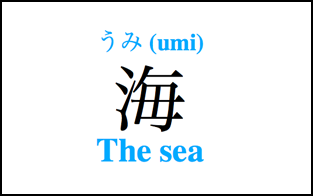
★ Today we visited the virtual umi!
★ Umi means sea or ocean in Japanese. Although there is another word for beach in Japanese (sunahama), it is more common to use umi when referring to the beach.
………………………………………………………………………………..
Example:
にちようびに海へ行きましょう。
Nichiyōbi ni umi e ikimashō.
Let’s go to the beach (lit. ocean) on Sunday.
………………………………………………………………………………..
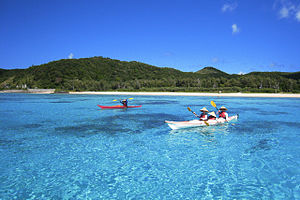
Sensei showed us this picture of Okinawa, Japan! Okinawa’s umi is so beautiful! When we go to Japan, let’s visit Okinawa together☆
………………………………………………………………………………..
Number 2:
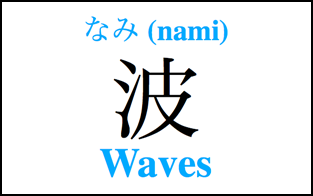
★ The sound of waves is so relaxing! The Japanese word for waves is nami!
★ The kanji for umi and nami both have a similar part (氵) on the left side called the sanzui radical. This radical can be found in many different kanji, and it gives the meaning of water. So if you see a kanji with this radical, you can guess that it has something to do with water!
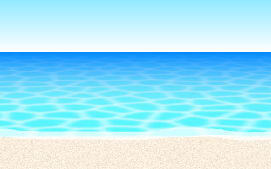
………………………………………………………………………………..
Number 3:
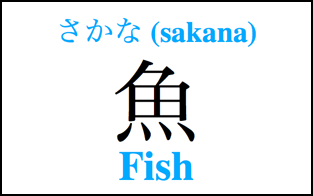
★ We saw some beautiful fish swimming in the water!
★ The Japanese word for fish is 魚 (sakana).
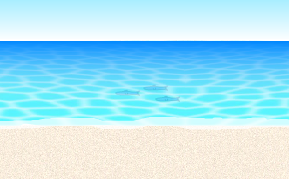
………………………………………………………………………………..
Number 4:
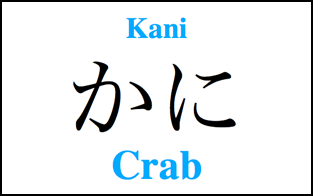
★ Kani means crab in Japanese!
★ The kanji for kani is 蟹 – Although there is kanji for this word, most people just use hiragana or katakana to write it.
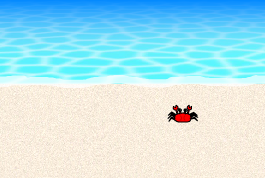
………………………………………………………………………………..
Number 5:
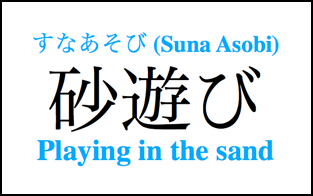
★ Suna asobi means playing in the sand!
★ This word is actually made up of two words: suna (sand) and asobi (play).
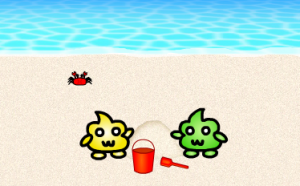
………………………………………………………………………………..
Number 6:

★ The Japanese word for shell is kai! There are many types of kai on the beach!
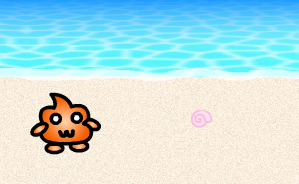
………………………………………………………………………………..
Number 7:
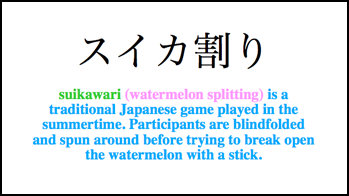
★ After they break open the watermelon, they eat the pieces! When doing suikawari, be sure to cool the watermelon in the water first!
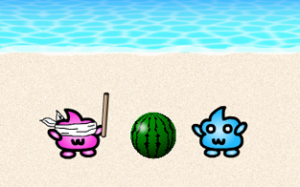
………………………………………………………………………………..
Number 8:
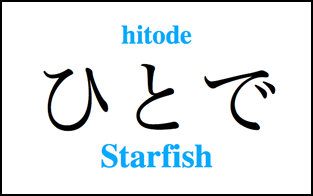
★ We also saw a hitode!
★ The kanji for Hitode is 人手 – 人 (ひと) is the kanji for person, and 手 (て) is the kanji for hand, so 人手 (ひとで) is like “person’s hand.”
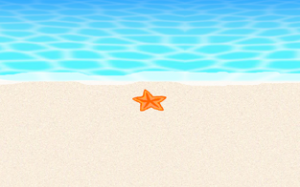
………………………………………………………………………………..
Number 9:
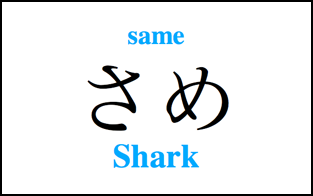
★ We thought we saw a same…
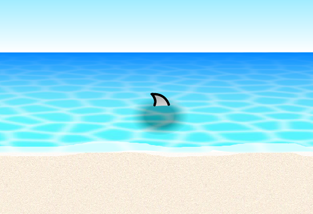
…but actually it was just our friend.
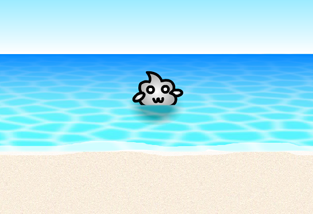
★ The kanji for same is 鮫 – it is common to use this kanji, but it is also common to just use hiragana or katakana to write this word.
………………………………………………………………………………..
Additional ocean vocabulary:
パラソル parasoru parasol
船 ふね fune boat
水着 みずぎ mizugi swimsuit
日焼け止め ひやけどめ hiyakedome sunscreen
亀 かめ kame turtle
(海豚) いるか iruka dolphin
(海月) くらげ kurage jellyfish
(鯨) くじら kujira whale
(蛸) たこ tako octopus
The kanji in parentheses is not used very often. It is more common to use hiragana or katakana for these words.
……………………………………………………………………………….
Conclusion:
We learned a lot of Japanese words on our trip to the ocean! But there are always more words! Study the additional vocab list to expand your Japanese knowledge! And of course, make sure to watch the next episode of our new Japanese vocabulary series!
………………………………………………………………………………..
Do you want a Japanese tutor?
Take Japanese Skype Lessons with Professional Japanese Teachers on kakehashijapan.com!
………………………………………………………………………………..
………………………………………………………………………………..







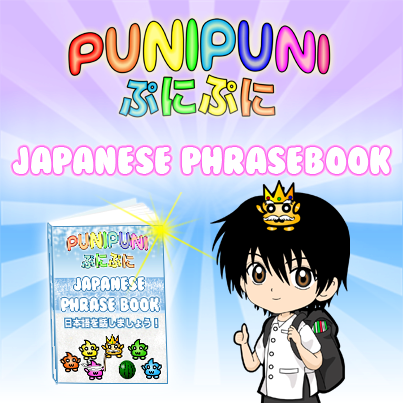

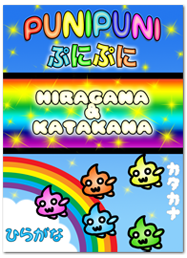
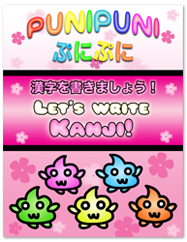
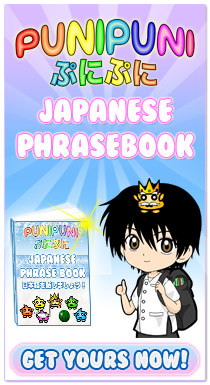

12 comments
i think punipuni is wounderful!!! 😀
Comment by cameo bruce on 09/30/2012 at 1:48 amありがとう! We will do our best for you (◕ω◕)♥
Comment by PuniPuni on 09/30/2012 at 8:47 amI just wondered if there is any logical reason why the kanjis for Oktopus (蛸) and the Kanji for frog (蛙)(from previous lesson) have the kanji for bug in them? What does a frog or an oktopus have to do with a bug?
Comment by Ahoy Hoy on 02/14/2013 at 6:42 amThat is an interesting question (◕ω◕)☆ Kanji does not always seem logical, but there is usually a reason behind it.
Kanji was invented by the Chinese a long time ago, and sometimes the meaning of certain kanji has changed over time, and also in use when it was adopted by Japanese.
If you look up this Chinese radical (part of the kanji), you will find that it can mean “insect” or “small creature” http://en.wiktionary.7val.com/wiki/Index:Chinese_radical
So, maybe this original broad definition is the reason that other animals such as octopus and frog also have this kanji radical.
Comment by PuniPuni on 02/14/2013 at 6:08 pmwhat is the Japanese word for squid?
Comment by allyiah williams on 07/12/2013 at 6:01 pmThe Japanese word for squid is: いか (ika) \(◕ω<)/♥
Comment by PuniPuni on 07/13/2013 at 7:04 pmHi.
I found some other kanji for starfish (海星, with literal meaning – sea+star – but the same sound as that you presented) and jellyfish (水母, literally “mother of water”). Are they commonly used? Is that OK if I use them in some occasions? Thanks.
Comment by Klinger on 12/01/2013 at 11:22 amHello! Actually, it’s most common to write both of these words (jellyfish and starfish) just using kana alone (hiragana or katakana). But, both 海星(ひとで) and 人手(ひとで)are perfectly acceptable. Same with 海月(くらげ) and 水母(くらげ). So, yes it is okay to use them but they are not so common. (◕ω◕)☆
Comment by PuniPuni on 12/02/2013 at 4:34 amMany many thanks for the clarification, sensei!
Comment by Klinger on 12/02/2013 at 10:08 amVery Helpful, arigatou gozaimasu..
Comment by Angellie Tiempo on 02/25/2014 at 2:35 pmThe one above says, “let’s go to the beach on sunday”
But how do I say: “Can we go to the beach and Let’s go to the beach?”
Thanks.
Comment by Akira on 05/23/2014 at 7:14 pmI’m not sure I understand your question, but I will try to answer.
Comment by PuniPuni on 05/23/2014 at 8:49 pmThere are always multiple ways to say the same thing in any language, but here is one way.
“Can we go to the beach?” – ビーチに行けませんか? (bīchi ni ikemasen ka?)
“Let’s go to the beach.” – ビーチに行きましょう。(bīchi ni ikimashō.)